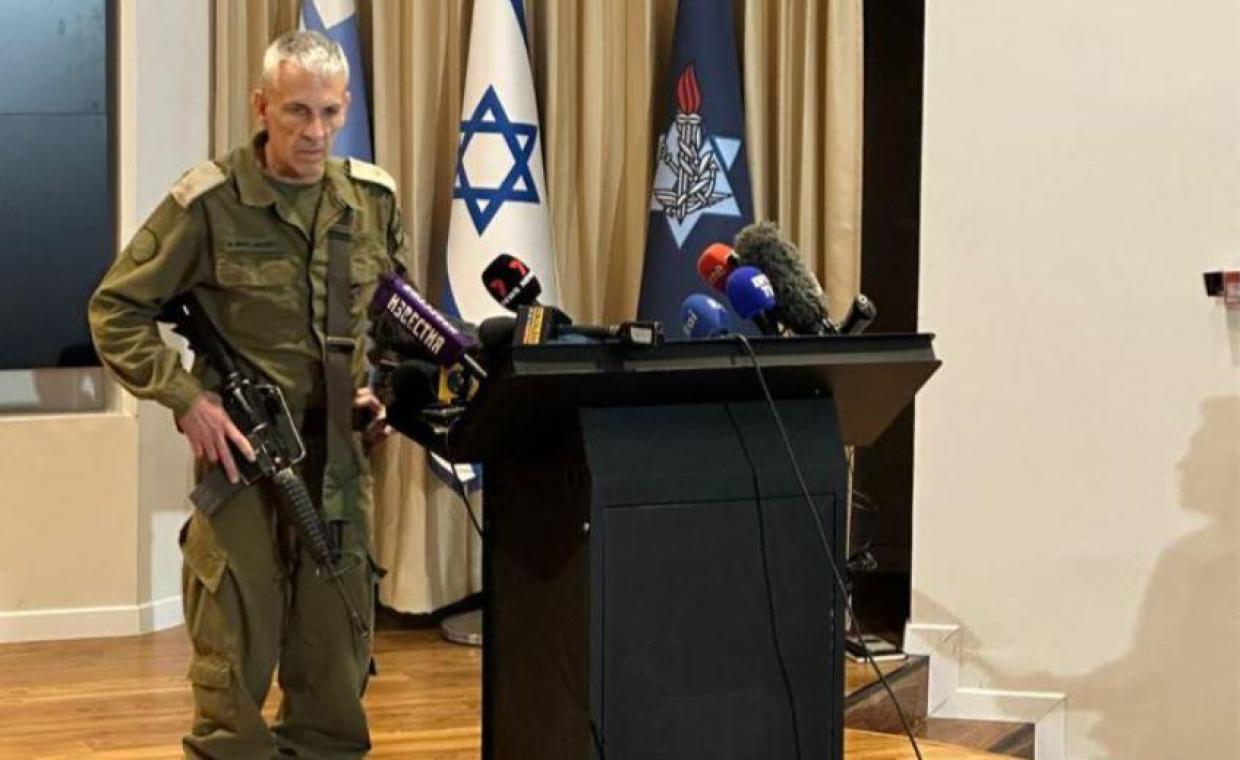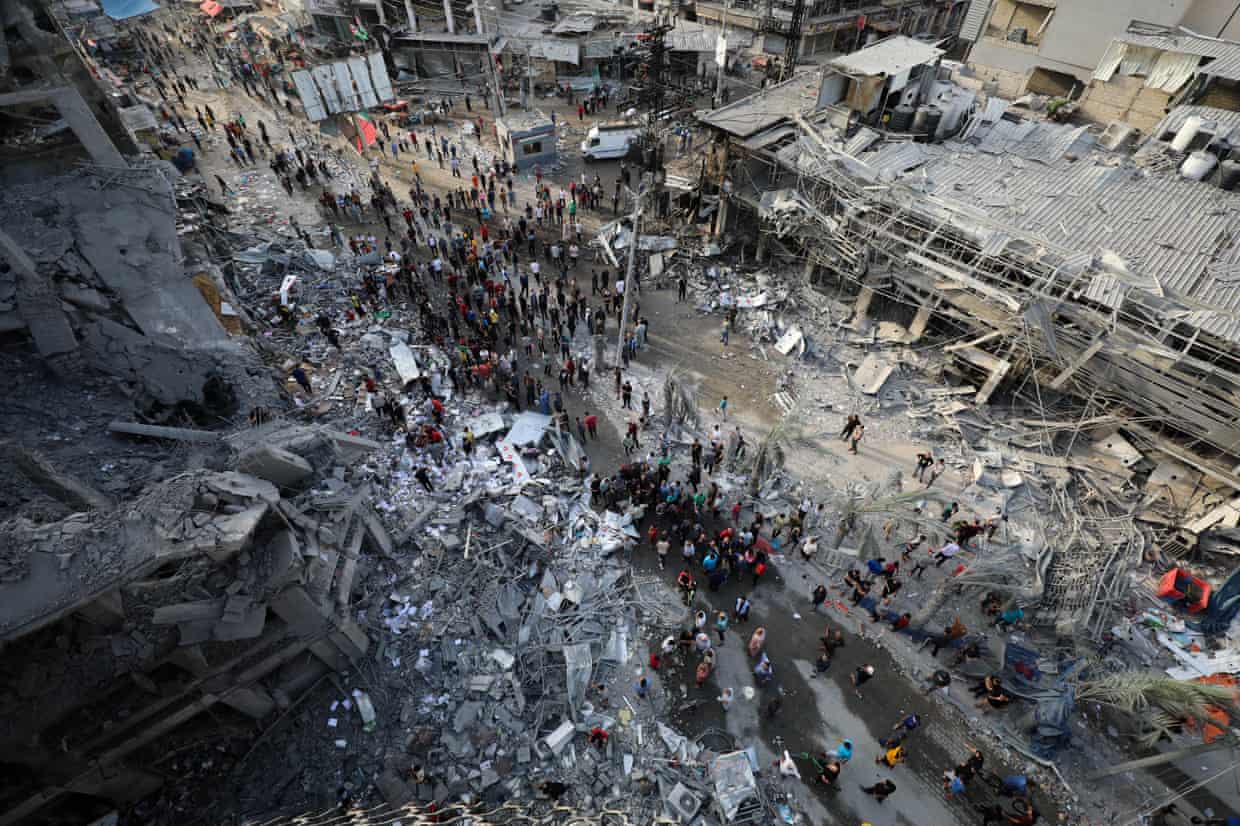The Smouldering Arab Middle East
 |
| Smoke rises in the aftermath of an Israeli airstrike in the northern part of the Gaza Strip, as viewed from the Israeli city of Sderot on Wednesday. (Ronaldo Schemidt/AFP/Getty Images) |
"The [Arab] street to a large extent is now in charge.""We were told for the last ten years that the Arab world and Muslim world didn't care about Palestine anymore, and Abraham Accords were proof of that.""Well, Palestine has come back. I don't think it ever went away."Bruce Riedel, senior fellow, Brookings Institution"With 600,000 Americans in Israel and threats to other Americans across the region, it's hard to think of an evacuation that might compare to this in scale, scope ad complexity.""The sort of advisories the State Department has put out lately have been fairly blunt."Suzanne Maloney, director, foreign policy, Brookings Institution"[A] broader escalation [is possible] in the days ahead. [Senior military leaders are taking] all necessary measures [to safeguard U.S. personnel].""We don't necessarily see that Iran has explicitly ordered them to take these kinds of attacks.""That said, by virtue of the fact that they [varied terrorist groups serving as Iran's proxies] are supported by Iran, we will ultimately hold Iran responsible."Brig.-Gen. Patrick Ryder, spokesman, Pentagon
 |
As Israeli forces, supported by U.S. weapons and military advisers prepare for a widely anticipated ground offensive against the Hamas terrorists responsible for the cross-border attack of barbaric proportions that surprised Israel's intelligence and military apparatus, leading Israel to mount an offensive of wide proportions in Gaza, the operation is acknowledged to come with grave risks of reigniting hostilities from the greater Arab/Muslim region.
Addressing that fraught issue, unidentified officials have detailed internal deliberations from the American perspective; including that U.S. citizens living in Israel and Lebanon have become particularly concerning to the U.S. administration, even as it considers an evacuation of that magnitude to be a nightmarish worse-case scenario, that leads to hopes that alternate outcomes may be more likely to occur.
Evidently irrespective of the administration's vigorous public support for Israel, it is alarmed by the potential of escalation, forcing it to turn attention to complicated logistics involved of having to swiftly relocate large numbers of people. About 600,000 US. citizens are in Israel, with another 86,000 believed to be living in Lebanon at the time of the Hamas attack, in reflection of State Department estimates. Hezbollah, a proxy Iranian terrorist group deeply entrenched politically in Lebanon is of particular concern.
The Party of God, as they call themselves was originally formed by the Quds Division of the Iranian Republican Guard Corps, trained and armed and answerable to the Islamic Republic of Iran. Concerns are that it seems quite likely that Hezbollah, with its immense stockpile of technologically updated rockets could be drawn into attacking Israel from the north, and in the process a two-front war could erupt stretching Israeli forces. Initial skirmishes have already occurred along their shared border.
 |
| Hamas uses an
elaborate network of tunnels for everything from storage to staging
attacks, and they pose a big challenge for Israel. Tunnels change the war and make things more
dangerous for the Israeli military and the Palestinians who live above
them. Still from video CBC News |
"This has become a real issue. The administration is very, very, very worried that this thing is going to get out of hand", cautioned one of the three in-the-know American officials who have spoken on condition of anonymity. Careful watch is being mounted on street protests spread across the Arab world, placing U.S. personnel and citizens in the region at heightened risk. The Gaza bombardment clearly inflaming regional fury with Israel and its purported treatment of Palestinians, once believed to have faded from public concern.
In the hopes of avoiding setting off a panic among Americans in the region, top American officials have refrained from discussing concerns and possible contingency plans publicly. The events of recent days, however, have shifted that posture, reflecting anxiety about other state actors entering the conflict. An advisory was issued last week by the State Department to all U.S. citizens worldwide "to exercise increased caution" reflecting "increased tensions in various locations around the world, the potential for terrorist attacks (and) demonstrations or violent actions against U.S. citizens and interests".
The Pentagon this week also signalled that it is bracing for a significant increase of attacks on US. troops stationed in the Middle East. Iran was singled out for its extensive sponsorship of terrorist groups with a history of using rockets and drones to target American military positions. In view of those concerns, Pentagon officials are surging additional missile-defence systems to the region.
The estimated 3,400 troops deployed in Iraq and Syria are considered to be particularly vulnerable as the situation unfolds; their deployment in Iraq and Syria saw U.S. personnel based close to the Jordanian border intercept two one-way attack drones. For years Americans operating in those countries were targeted by Iranian-backed militias.
 |
| Extensive destruction at the Nuseirat refugee camp in the central Gaza Strip. Photograph: Adel al-Hwajre/ImagesLive/Zuma Press/Shutterstock |
Labels: American Military Personnel, Arab Street Sentiments, Hamas Deadly Incursion, Israel at War, U.S.Citizen Evacuations

0 Comments:
Post a Comment
<< Home